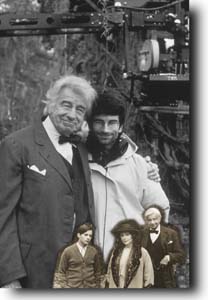Harping on Old Times
Truman Capote's reminiscences
By Richard von Busack
SOMETIMES, watching a team of elderly actors is an unsettling business. You're conscious of the possibility that you might never see them acting together again, but if they're in something shapeless, you don't care. In The Grass Harp, Jack Lemmon, playing an unsavory city slicker named Morris Ritz, gets a potentially telling moment with Walter Matthau, as a benevolent retired judge, but the scene ends just as the momentum starts to build.
Matthau represents a classic example of mom's old warning about making a face and having it stay like that for the rest of your life. His face says that he's too deeply suspicious of the human race to change his opinion this late in life. In The Grass Harp, however, he is forced to instruct a young man, telling him that before you love a woman, you must first fall in love with a little thing--a leaf, for example (he holds up a dead leaf to demonstrate). This sort of mush is, I think, a serious misuse of a real demigod of cynicism.
The Grass Harp, based on Truman Capote's book, takes place at the cusp of the 1930s and '40s in a small Alabama town. After the tragic deaths of both parents, young Collin Fenwick (Edward Furlong), our narrator, comes to live with his aunts, night and day versions of each other. Verena Talbo (Sissy Spacek) is a tight-fisted woman who owns the town; Dolly Talbo (Piper Laurie), simple and sweet, is more given to the fields and the streams. After a fight with Verena, the trio of Dolly, Collin and Catherine Creek (Verena's servant, played by Nell Carter) camps out in an abandoned tree house. The three become a cause célèbre, refusing to leave the tree even under the urgings of the local sheriff. Charlie Cool, the retired judge, sensing a kindred rebellious spirit, begins a shy courtship of Dolly.
The film is probably meant as family fare, with its requisite complement of grandfatherly actors--not that anyone with a good memory could quite claim that Matthau exemplifies a time when movies were clean and sex was dirty. Luckily, Laurie provides an interesting counter-current that keeps the film from being boring. She has fine dark eyes and a face of Renoir-like plumpness and sensuality. You can see what might draw a young man to fall in love with her. The movies have given us an armada of imperious, dotty Southern aunts who, you're led to believe, could have saved the day at Gettysburg if they'd only been given enough horses. Laurie's Dolly is the first one of these aunts who seems to have a body--even despite the Hallmark-card squibs she must deliver for dialogue. Her acting is more deeply felt than anything else is this safe, classic adaptation.
The film backs away from the Southern Gothic touches that were really all that Capote had for tension, but thanks to Laurie's performance, The Grass Harp avoids simple-mindedness. The result is a strange mix of the golden and the macabre, as if Norman Rockwell had tried to paint a brooding landscape.
[ Metro | Metroactive Central | Archives ]
This page was designed and created by the Boulevards team.

Southern Gothic Generations: Young Collin (Edward Furlong, left) learns the proverbial lesson in life from his Aunt Dolly (Piper Laurie) and crusty old Charlie Cool (Walter Matthau).
get the soft-focus treatment
The Grass Harp (PG; 107 min.), directed by Charles Matthau, written by Stirling Silliphant and Kirk Ellis, photographed by John A. Alonzo and starring Piper Laurie and Walter Matthau.
From the December 19-25, 1996 issue of Metro
![[Metroactive Movies]](/movies/gifs/movies468.gif)